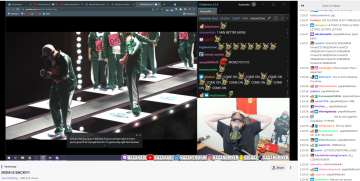For the uninitiated, Twitch is website on which content ‘Creators’ perform for audiences around the world. That performance is called ‘streaming’. As a consumer of Twitch content, I have always been curious about the copyright implications of streaming. Especially given the rise of ‘Just Chatting’ streams, where the Creators often merely just watch (and react) to online content, including full-length episodes of copyrighted shows. This blog post is a cursory look into the copyright implications of Twitch streaming in Canada.
First, the financial implications. Streaming can be incredibly lucrative – for those that amass a loyal following. In October 2021, a breach of Twitch’s data revealed the amounts Creators received from Twitch from monthly subscriptions, ‘bit’ donations from viewers, and from advertising revenue. The #2 earning Creator, ‘xQc’ (né Félix Lengyel) a French-Canadian, former professional Overwatch player, and a streamer I watch personally, received just under $8.5 million USD from August 2019 to October 2021. That amount does not include amounts received for any personal sponsorships, direct donations, contract bonuses, YouTube ad revenue, or merchandise sales. HasanAbi (né Hasan Piker) a polarizing leftist streamer, recently bought a house in West Hollywood worth a cool $2.74 million USD.
But what do mansions have to do with intellectual property law? Well, streaming is time-consuming, and the Creators need something to… “create”. For example, as of November 25, according to TwitchMetrics, xQc streamed for 258 hours for the month, an average of 10 hours a day, and Hasan for 178, an average of 7 hours a day. That’s a lot of content. What sort of Copyright protection do or ought these streamers receive?
The vast majority of Hasan’s content is ‘Just Chatting’, where he does political commentary, and also reacts to videos he watches on the internet. For example, Hasan’s stream on November 24 was just over 9 hours long, during which he watched videos from a variety of Youtube channels, including MSNBC, CNN, and the Grand Tour.
Does Hasan garner copyright protection over the content he creates? For example, in the same stream Hasan watched the entirety of a 25-minute real-life Squid Game. The video itself was thrilling, but the viewing experience was altered and arguably improved by not only Hasan’s reactions, but the reactions of the over 30,000 people watching and participating in the chat, which scrolls continuously to the right of the screen.

To me this recorded video of Hasan’s stream, clearly obtains copyright. I suggest that the work obtains protection either under section 5 of the Copyright Act as an original dramatic work, or a compilation of dramatic works. Or, under section 15 of the same Act as a fixed recording of a performance.
I would also contend that Hasan’s stream is an ‘original’ work pursuant to section 5 of the Copyright Act, as defined by McLachlin J. in CCH Canadian Ltd v LSUC. Far from being a mere ‘copy’ of the videos he watches, Hasan exercises skill and judgment during his livestreams. He uses his “capacity for discernment” (see CCH Canadian Ltd at para 16) to select entertaining videos to watch. He often pauses videos to commentate, and has developed an “aptitude or practised ability” (see CCH Canadian Ltd, ibid) to attract large numbers of viewers, sometimes in the hundreds of thousands, to watch his content.
However, where a streamer merely watches videos without adding anything of substance to them, it is more difficult to say that work is sufficiently ‘original’. This raises the question of ‘fair dealing’ under section 29.1 of the Copyright Act, which permits users to reproduce copyrighted content (Youtube videos), for the purpose of ‘criticism’ or ‘review’. Where there is no criticism, nor review, it is much easier to argue both that no copyright protection should obtain, and that the streamer is infringing upon the copyright of the videos they watch.
Notwithstanding any rights that Hasan has contracted away to Twitch, and the fact that Hasan produced the video in the US on a US website, Canadian copyright law would give him the sole right to produce, reproduce, and publish the recording of his livestream.
 Copyright & Social Media
Copyright & Social Media Communications Law
Communications Law